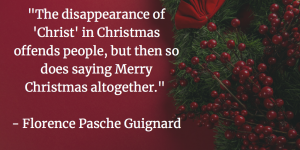Courtesy of Toronto Christmas Market.
The Christ mass comes secondary to the gift buying celebration of the holiday season as traditions become part of non-Christian December festivities.
Music courtesy of KON via YouTube. Video by Gracie Brison.
By: Alya Stationwala
It’s late on Christmas Eve. The lights are out and her boys are fast asleep in bed. Her and her husband are rummaging around the house for the hidden gifts they have left around, placing them under the tree, preparing for the excitement and joy of tomorrow.
For Muslim interfaith outreach activist Farhat Biviji, Christmas was always a celebration that brought her family closer together for a day: covered in ripped wrapping paper and sticky from breakfast pancakes while they sat on the couch watching holiday shows.
Originally a celebration of the birth of Jesus Christ, Christmas has gradually given into the dynamics of consumerism and materialism, as most religious festivals do, according to Ryerson University religious studies professor Florence Pasche Guignard.
“The origins of Christmas as a religious celebration has been lost, and now it is simply a vehicle for getting people to buy stuff they don’t need and will probably never use,” said Biviji.
Statistics Canada’s December 2016 data stated around $460 million were spent on toys, games, and hobby supplies and $5.1 billion on food and beverages.
The Coca-Cola creation of the jolly Saint Nick for their Christmas campaign commercials between 1931 onward, are among the many commercialization of an otherwise Christian celebration, according to Zita Thornton’s article Happy Coca-Cola Christmas.
“This time of the year is indeed synonymous with one of celebration with new meanings: employees have one or more days off, children and students have a break from school, and families get to spend ‘quality’ time together,” said Guignard.
Since her kids have grown up, Bivji spends her Christmases travelling, losing the special significance she used to have with the holiday.
Despite her non-Christian religious beliefs, Christmas remains a favourite of hers, “ relishing [in] my boys’ excitement and their joy at opening their gifts,” said Biviji.
The War on Christmas
Video by Harry Faulkner.
With consumerism at its peak around this time – a 203.7% increase from average monthly sales for toys according to Statistics Canada – the holiday is not limited to any particular faith anymore.
Inclusivity has introduced terms like “Happy Holidays” to replace “Merry Christmas” greetings, but debates around the generalization of the holiday season have sparked across Christian and non-Christian communities, according to Guignard.

“Even though the main reference indeed remains a vaguely Christian one for historical and cultural reasons, what we should call, in more inclusive and accurate terms, the ‘end of the year festivities’ have indeed become a ‘special time’ for everyone, not just for Christians,” said Guignard.
“Given that the holiday being celebrated is in fact Christmas, I feel that Merry Christmas is an entirely appropriate greeting, whereas Happy Holidays is a politically correct cop out,” said Biviji.
Guignard, on the other hand, said, “We should be grateful to live in a context that allows each person to enjoy celebrating ––or not–– what they choose: the birth of Jesus, a generic Holiday Season, another specific religious event, or why not, all of this together.”
Infographics by Emma Sandri.





Leave a Reply